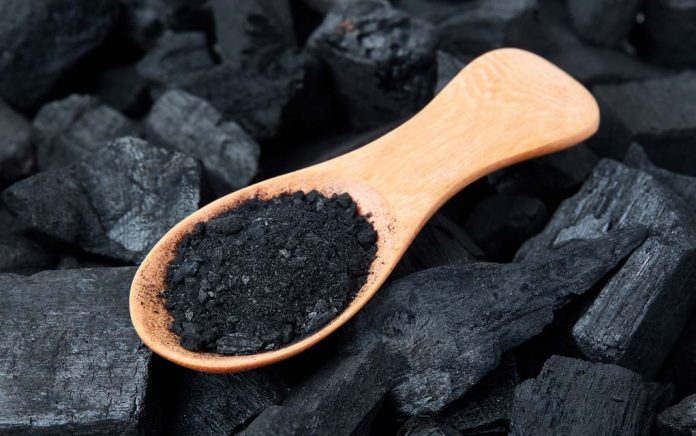
While the word “charcoal” may make you think of something you toss into your barbecue or dig out of your fireplace once the embers have cooled, activated charcoal (aka activated carbon) is quite different. In fact, the charcoal you use to roast your corn on the cob in the summer is chock full of chemicals and other toxins, while activated charcoal is burning with health benefits!
Activated charcoal is produced from materials that are carbon-dense (e.g., coconut husks, wood, coal, nutshells, and peat) that have been activated using gases (usually argon or nitrogen) or chemicals and then exposed to high temperatures. The result is carbon in the form of a tasteless, odorless black powder that has an expanded surface area, a characteristic that makes it especially effective for various health purposes.
The expanded surface area of activated charcoal has millions of tiny pores, which provide plenty of room to bind with toxins and chemicals. This porous surface has a negative charge, which attracts positively charged gas and toxins to bond with it. Once bound to the charcoal, these undesirable substances can be transported out of the body. It’s estimated that activated charcoal can reduce the absorption of toxins by up to 60 percent.
That’s just one of several reasons why hospitals and clinics keep a supply of activated charcoal on hand. You may want to keep some at home as well once you learn about 9 health benefits of activated charcoal and how it can be used.
1. Use activated charcoal to treat acute poisoning and/or overdose.
In some cases and when used along with other treatments, activated charcoal can be an effective way to rid the body of certain chemicals and toxins. The powder is mixed with water and can be drunk or administered via a tube into the throat and stomach. However, you should always contact a poison control center, your doctor, or an emergency room before you take or give anyone activated charcoal. The use of activated charcoal in cases of acute poisoning or overdose should be administered by knowledgeable healthcare professionals only unless you have been instructed by them to do otherwise.
Activated charcoal should not be used for poisoning from alcohol, cyanide, lithium, iron tablets, cleaning fluid, gasoline, or any strong acids or bases. It is effective against bleach, fertilizer, mercury, pesticides, most organic compounds, aspirin, cocaine, morphine, and opium.
Don’t guess! Seek professional help immediately and let them know what has been swallowed.
2. Use activated charcoal to protect pets.
As with humans, activated charcoal can be used in an emergency situation if your pet has eaten something poisonous, such as certain plants or potentially toxic items. However, the same rules apply to dogs and cats as to people: activated charcoal should not be given if the animal has consumed the same substances named for humans. Your first moves should be to contact poison control for animals (ASPCS Animal Poison Control: 888-426-4435) or a veterinarian and to get your pet to a vet immediately. You may be instructed by poison control or your vet to administer activated charcoal, but do not do so without professional advice!
3. Activated charcoal can prevent gas and bloating.
Tablet and capsule forms of activated charcoal can be used to alleviate gas and bloating. The gas-producing factors in food bind to the charcoal and can provide relief from symptoms of bloating and abdominal cramping. These benefits were seen in a study of 99 adults (30 from the United States and 69 in India), who had different dietary habits. Compared with a placebo, the use of activated charcoal provided significant symptom relief in both groups after they consumed a gas-producing meal.
The suggested dosing of activated charcoal for gas and bloating is 500 milligrams taken one hour before eating a gas-producing meal. You should drink two 8-ounce glasses of water immediately after taking the charcoal so it can get into your system. If you use activated charcoal for a long time, you are more likely to experience side effects (see below).
4. Activated charcoal to relieve bites and rashes.
Activated charcoal is a handy remedy to have on hand in your first aid kit for insect and snakes bites as well as poison ivy rashes. After a bee sting or mosquito bite, mix one capsule of activated charcoal with ½ tablespoon of coconut oil and apply it to the affected area. Place a bandage over the treated sting or bite, since activated charcoal can stain clothing. Reapply the remedy every 30 minutes until symptoms are relieved.
If you have been bitten by a spider – such as the brown recluse or black widow – apply the same remedy to the bite as well as the area around it by several inches. Apply the remedy to the bandage and wrap it around the bite. Reapply every two to three hours and rinse the area well between applications and seek medical attention.

5. Treat acne with activated charcoal.
A combination of two teaspoons of aloe vera gel and one capsule of activated charcoal can be applied to acne. Allow the mixture to dry and then rinse it off. Environmental toxins and other substances bond with the charcoal while the aloe vera gel is soothing.
6. Activated charcoal can detox your digestive system
Let me begin by saying that experts don’t agree on this use of activated charcoal. Well-known alternative practitioner Dr. Andrew Weil, for example, does not advocate using it for detox. Dr. Josh Axe, however, states that activated charcoal can help support a healthy digestive tract because it can remove environmental toxins that can cause allergic reactions and have an adverse impact on immune system function. Axe recommends taking 10 grams of the supplement 90 minutes before each meal for two days during a cleanse, during which you should consume only organic produce, grass-fed meats, wild fish, and lots of water.
Read tips on how to detox your body
7. Reduce high cholesterol.
If you have high cholesterol, a possible alternative (or complementary) remedy is activated charcoal. One Lancet study reported that study volunteers who took three 8-gram doses of activated charcoal for four weeks experienced an average decline of 25 percent in total cholesterol and 41 percent in bad (LDL) cholesterol, while also showing an 8 percent increase in good (HDL) cholesterol. A later study involving 10 patients with severely high cholesterol showed similar positive results: after three weeks of taking 16 grams of activated charcoal daily, drops in total and LDL cholesterol were 23 and 29 percent, respectively.
8. Whiten your teeth with activated charcoal.
If you have tea, berry, wine, or coffee stains on your teeth, activated charcoal may help. Plaque and minute particles will bind to the charcoal as well as help fight bad breath and gum disease. However, do not use it on porcelain crowns, caps, or veneers, because the charcoal will stain them. To whiten your teeth, dip a wet toothbrush into powdered activated charcoal and brush your teeth like you always do. Take a sip of water, swish it around your mouth thoroughly, then spit it out. Rinse your mouth well, making sure there is no trace of charcoal in your spit. Use activated charcoal two to three times a week.
9. Purify water.
Activated charcoal water filters can be used to filter carbon-based impurities such as pesticides, fluoride, industrial waste, and other chemicals as well as chlorine from your drinking water. These filters will not, however, trap bacteria, minerals, viruses, nitrates, and other substances not attracted to carbon. If you use activated charcoal filters in your home, you must replace them regularly because they cease being effective once all the bonding pores are filled.
Side effects of activated charcoal
When activated charcoal is taken by mouth, it may cause black tongue, black stools, diarrhea, vomiting, or constipation. In severe cases, it can cause blockage of your gastrointestinal tract. Anyone who is taking acetaminophen, digoxin, theophylline, or tricyclic antidepressants should not use activated charcoal as a supplement because it can reduce or prevent their absorption. Activated charcoal also may bond with some nutrients, but this is not considered to be a problem when it is used for poisoning or overdose treatment.
Important tips when taking activated charcoal
When using activated charcoal orally for uses other than poison or overdose treatment, do not take other medications or supplements within two hours, as the charcoal can reduce absorption. You also should drink 10 to 16 glasses of water daily, as it will assist in eliminating toxins and preventing constipation, which is a possible side effect.
On a humorous note…The authors of a 2013 article in the New Zealand Medical Journal discussed the problem of flatulence on airplanes and how it can be uncomfortable for passengers to “hold it in” yet embarrassing to release gas in such a closed-in environment. Therefore, they proposed that airlines embed activated charcoal in airline seat cushions to handle this matter. I’m unaware of any airline that has taken up this challenge, but it is an interesting idea!
Read next:
5 Ways to Better Absorb Vitamins and Minerals
Digestion and Detox: How to Do Them Right
DISCLAIMER: This article contains affiliate links, which means that if you click on one of the product links, Naturally Savvy will receive a small commission so we can keep pumping out amazing articles like this one. Thank you so much for your support!
Sources
Dr. Axe. Activated charcoal uses and benefits
eMedicine Health. Activated charcoal
Jain NK et al. Efficacy of activated charcoal in reducing intestinal gas: a double-blind clinical trial. American Journal of Gastroenterology 1986 Jul; 81(7): 532-35
Kuusisto P et al. Effect of activated charcoal on hypercholesterolaemia. Lancet 1986 Aug 16; 2(8503): 366-67
Neuvonen PJ et al. Activated charcoal in the treatment of hypercholesterolaemia: dose-response relationships and comparison with cholestyramine. European Journal of Clinical Pharmacology 1989; 37(3): 225-30
Pommergaard HC et al. Flatulence on airplanes: just let it go. New Zealand Medical Journal 2013 Feb 15; 126(1369): 68-74
Dr. Andrew Weil. Activated charcoal for a cleaner you.










